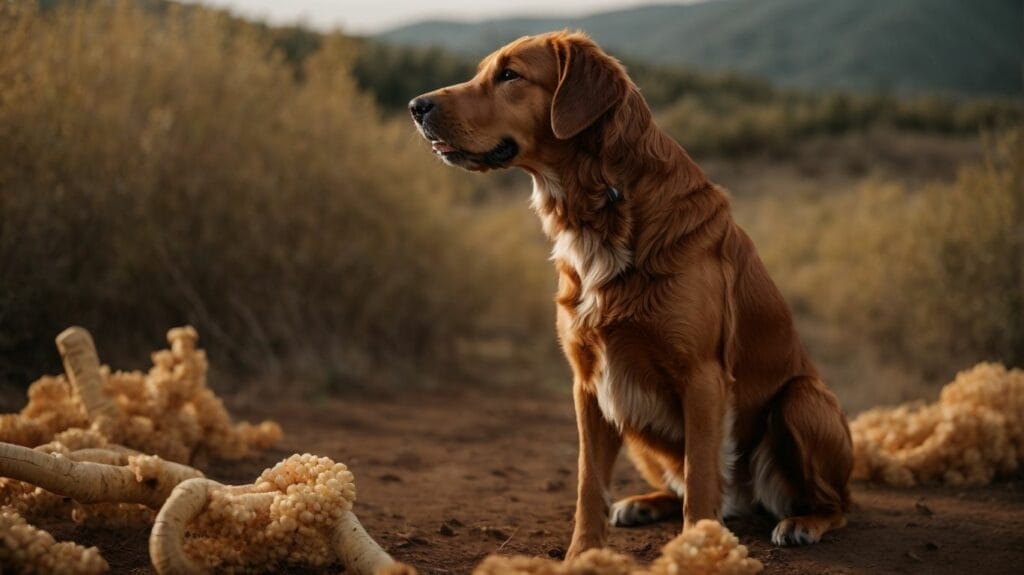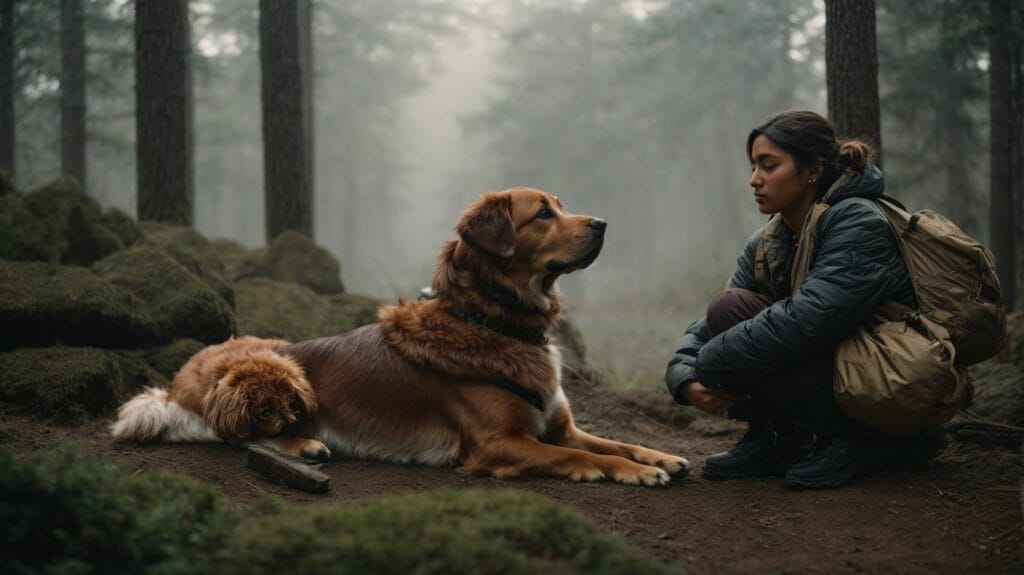Can Dogs Digest Bones?
The topic of whether dogs can digest bones is a common concern among pet owners. While bones are a popular treat for dogs, not all types of bones are safe for them to consume. It’s essential to understand the differences between raw and cooked bones and their potential risks.
Raw bones, such as raw beef bones or raw chicken bones, are generally considered safer for dogs to digest. These bones are softer, and when consumed, they can provide essential nutrients and promote dental health. However, it’s crucial to supervise your dog while they are chewing on raw bones to prevent any choking hazards.
On the other hand, cooked bones, especially those from poultry or other small animals, can be dangerous for dogs. Cooking makes the bones brittle, and they are more likely to splinter when chewed. This splintering can lead to severe complications, including choking, injuries in the digestive system, or blockages. It’s crucial to never give your dog cooked bones as a treat or for chewing.
Understanding the potential risks is crucial for keeping your furry friend safe. Ingesting bones can cause various problems for dogs, such as choking hazards, splintering in the digestive system, and the potential for injuries or blockages. These complications can lead to severe discomfort and may require immediate veterinary attention.
To safely give bones to dogs, pet owners should follow certain guidelines. It’s recommended to choose raw bones that are appropriate for the size of your dog and supervise your dog while they are chewing on the bone. It’s important to properly store and discard bones to prevent any contamination or bacterial growth.
If you prefer to avoid bones altogether, there are alternative options that can provide similar benefits. Safe chew toys, such as rubber toys or nylon bones, can satisfy your dog’s natural urge to chew and help maintain dental health. Natural dental chews, like certain types of rawhide or dental treats approved by veterinarians, can also be a safer alternative to bones.
Key takeaways:
- Dogs can safely digest raw bones: Raw bones are a natural and healthy option for dogs to consume. The chewing and grinding action can help to clean their teeth and provide mental stimulation.
- Caution with cooked bones: Cooked bones are dangerous for dogs as they can splinter, leading to choking, injuries, or blockages in their digestive system. It is important never to give dogs cooked bones.
- Alternatives to bones: There are various safe chew toys and natural dental chews available for dogs, which can provide similar benefits to bones without the risk of injury or blockages.
Can Dogs Digest Bones?
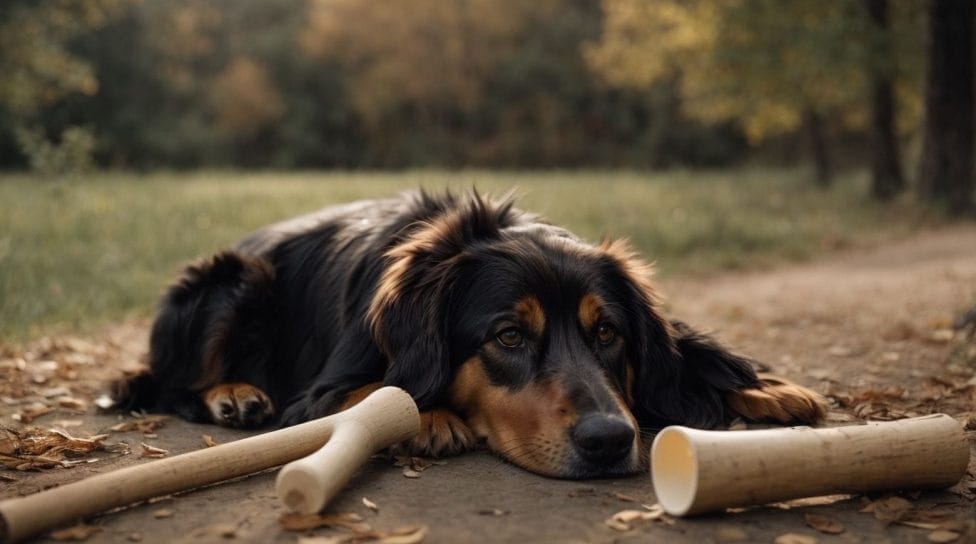
Photo Credits: Petnarnia.Com by Roger Young
“Can Dogs Digest Bones?
Dogs have the amazing ability to digest bones, but it is crucial to be aware of the risks involved. While bones do provide nutrients and dental benefits, they can also present hazards. It is important to note that cooked bones have the potential to splinter, which can cause injuries to the digestive tract. Additionally, larger or tougher bones can lead to choking or dental fractures. For the sake of safe digestion, it is recommended to opt for appropriate bones, such as raw bones, which are softer and less prone to splintering. It is always advisable to supervise your dog and seek guidance from a veterinarian before introducing bones into their diet. As an illustrative incident, my friend experienced an emergency when their dog swallowed a small cooked bone, emphasizing the importance of bone safety.
“
Types of Bones Dogs Can Digest
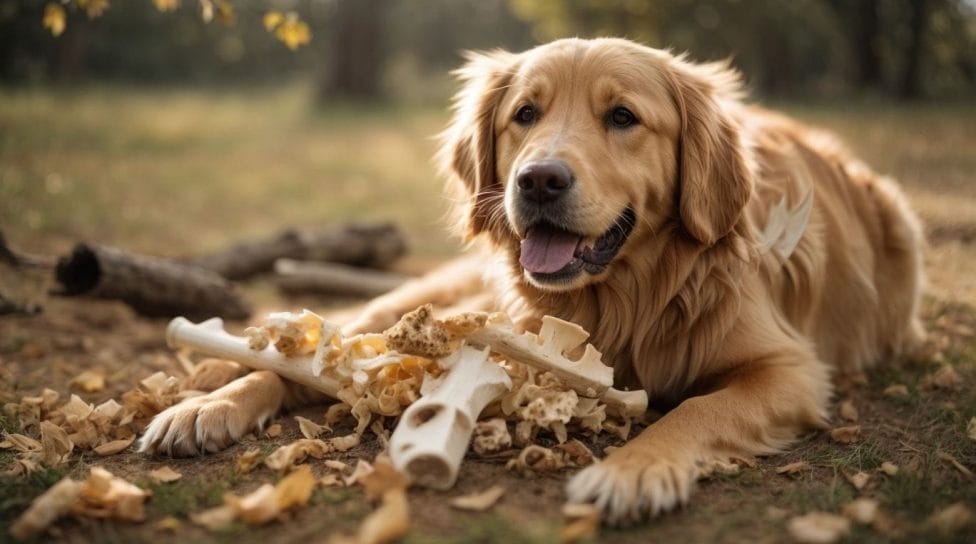
Photo Credits: Petnarnia.Com by Keith Davis
When it comes to feeding dogs bones, it’s important to know the types of bones dogs can digest. Some bones can splinter and cause harm to their digestive system. Here are the types of bones dogs can digest:
- Raw bones: These types of bones are softer and less likely to splinter, such as raw chicken or beef bones.
- Edible bones: These types of bones are made from natural ingredients, like rawhide or dental chews.
- Large, weight-bearing bones: If your dog is a strong chewer, consider giving them these types of bones, such as knucklebones or beef leg bones.
Always monitor your dog while they are chewing on bones and consult with your veterinarian to ensure their safety.
What Are Raw Bones?
What Are Raw Bones?
Raw bones are uncooked bones that are fed to dogs as a natural and nutritious treat. These bones, which can be obtained from a butcher or pet store, come from animals such as chicken, beef, or lamb. Raw bones are rich in important nutrients, including calcium and phosphorus, which provide numerous benefits for a dog’s teeth and bones. However, it is crucial to supervise dogs while they chew on raw bones to prevent any choking hazards. Additionally, it is important only to give dogs raw bones that are appropriate for their size to avoid any injuries or blockages.
Are Raw Bones Safe for Dogs to Digest?
Are Raw Bones Safe for Dogs to Digest?
Raw bones can indeed be safe for dogs to digest, provided that certain precautions are taken. It is crucial to opt for appropriate bones, specifically raw meaty bones, which are proportioned correctly for your canine companion. It is advisable to steer clear of weight-bearing bones that may be excessively tough and potentially lead to dental fractures or digestive blockages. Additionally, it is essential always to supervise your dog while they are engaged in bone chewing activities and promptly dispose of any small or sharp bone fragments. To ensure that raw bones are a suitable choice for your dog’s specific health needs, it is wise to consult with your veterinarian. Remember that when given safely, raw bones can offer dental benefits and provide mental stimulation for dogs.
What Are Cooked Bones?
Cooked bones are bones that have been heated through cooking methods such as boiling, baking, or grilling. What Are Cooked Bones? When bones are cooked, their structure changes, making them more brittle and prone to splintering. This can be dangerous for dogs as the splintered pieces can cause serious injuries to their digestive system. It is important to note that cooked bones should never be given to dogs as treats or for chewing purposes. Instead, provide safe alternatives such as raw bones or specially designed chew toys that are made to withstand chewing and promote dental health.
Can Dogs Safely Digest Cooked Bones?
Can Dogs Safely Digest Cooked Bones? Cooked bones should never be given to dogs as they pose serious health risks. Can dogs safely digest cooked bones? Here are some key reasons why dogs cannot safely digest cooked bones:
Fragility: During the cooking process, bones become brittle and can splinter easily, causing choking hazards and internal injuries.
Blockages: Cooked bone fragments can get stuck in a dog’s digestive system, leading to blockages that require surgical intervention.
Mouth and throat injuries: The sharp edges of cooked bones can cause cuts and wounds in a dog’s mouth, throat, and digestive tract.
To ensure your dog’s safety, it’s important to opt for safer alternatives like raw bones or specially designed chew toys. Always consult with a veterinarian for guidance on the best options for your dog’s chewing needs.
What Happens if Dogs Ingest Bones?
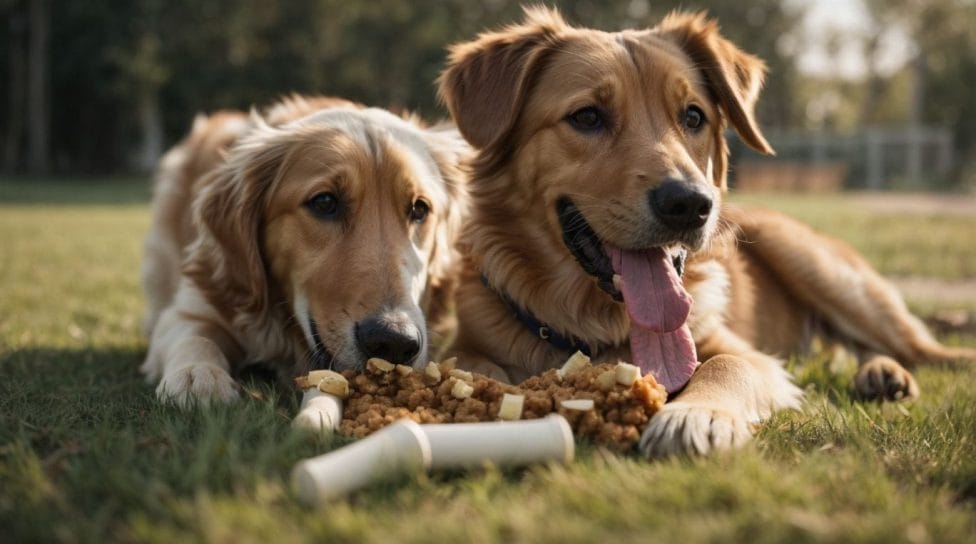
Photo Credits: Petnarnia.Com by Alexander Jones
When dogs ingest bones, it can lead to various issues and consequences. What happens if dogs ingest bones? The bones may splinter and cause choking, blockages, or perforations in the digestive tract and damage to the teeth, gums, and mouth. Some symptoms of bone ingestion include vomiting, diarrhea, abdominal pain, and difficulty passing stool. If you suspect your dog has ingested a bone, it is crucial to seek immediate veterinary attention. To prevent such problems, it is best to avoid giving dogs bones altogether. Instead, offer them safe and appropriate chew toys or treats specifically designed for their dental health.
Can Dogs Choke on Bones?
Can dogs choke on bones? Yes, they can. However, it largely depends on the type and size of the bone given to them. It is crucial to consider the following points:
- Size: Ensure that the bones you offer to your dog are suitable for their size. Giving them small bones can pose a risk of getting stuck in their throat, while large bones may cause blockage.
- Type of bone: It is important to avoid giving your dog bones that are hard, brittle, or have sharp edges. Such bones can break or splinter easily, leading to potential choking incidents or injuries.
- Supervision: Whenever your dog is chewing on a bone, it is essential to supervise them. This way, you can ensure their safety and promptly intervene in case of any choking incidents.
Can Bones Splinter in a Dog’s Digestive System?
Yes, bones can splinter in a dog’s digestive system. When dogs chew on bones, they have the potential to break into sharp fragments that can cause harm when ingested. These splintered bones can puncture the dog’s digestive tract and result in serious internal injuries or blockages. It is important to be aware that both cooked and raw bones can splinter. To ensure the safety of your dog, it is advisable to completely refrain from giving them bones. Instead, it is recommended to choose safe chew toys or natural dental chews that are specifically designed for dogs. Remember, it is always wise to consult with your veterinarian before introducing new treats or toys to your dog.
Can Bone Fragments Cause Injuries or Blockages?
Bone fragments can indeed cause injuries or blockages in dogs. The act of chewing on bones poses a risk as bone splintering may occur, leading to the ingestion of sharp fragments. These fragments can inflict damage to the mouth, throat, or even the digestive system during their passage. There are instances when the fragments become lodged in the intestines, forming a blockage that might necessitate surgical intervention. To mitigate these risks, it is crucial to supervise dogs while they chew on bones and refrain from providing them with small or brittle bones that are prone to splintering. It is always advisable to consult with a veterinarian before offering bones to your dog.
How to Safely Give Bones to Dogs
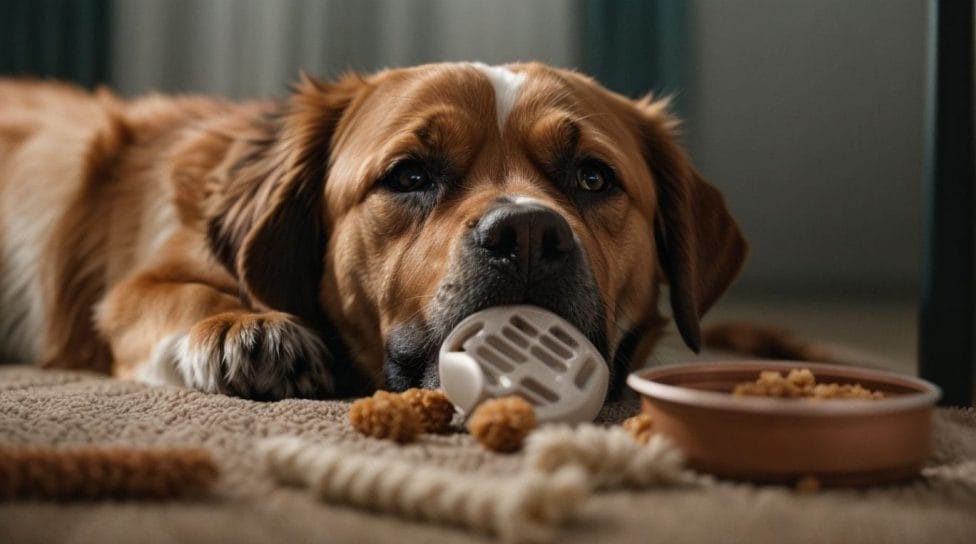
Photo Credits: Petnarnia.Com by Bobby Williams
How to Safely Give Bones to Dogs
Giving bones to dogs can be a controversial topic. While it is generally not recommended to give cooked bones to dogs due to the risk of splintering, there are safe ways to provide bones for chewing and dental health. Here are some steps to safely give bones to dogs:
- Choose Raw Bones: To safely give bones to dogs, opt for raw bones such as raw meaty bones or raw marrow bones.
- Size Matters: The size of the bones you choose is crucial when giving bones to dogs. Select bones that are appropriate for the size of your dog to prevent choking or blockage hazards.
- Supervise: It is essential always to supervise your dog while they are chewing on a bone to prevent any accidents or injuries.
- Limit Time: To ensure your dog’s dental health and prevent digestive issues, limit the time they spend chewing on a bone.
- Proper Storage: Properly store bones when not in use to avoid any contamination or spoilage.
Alternatives to Bones for Dogs
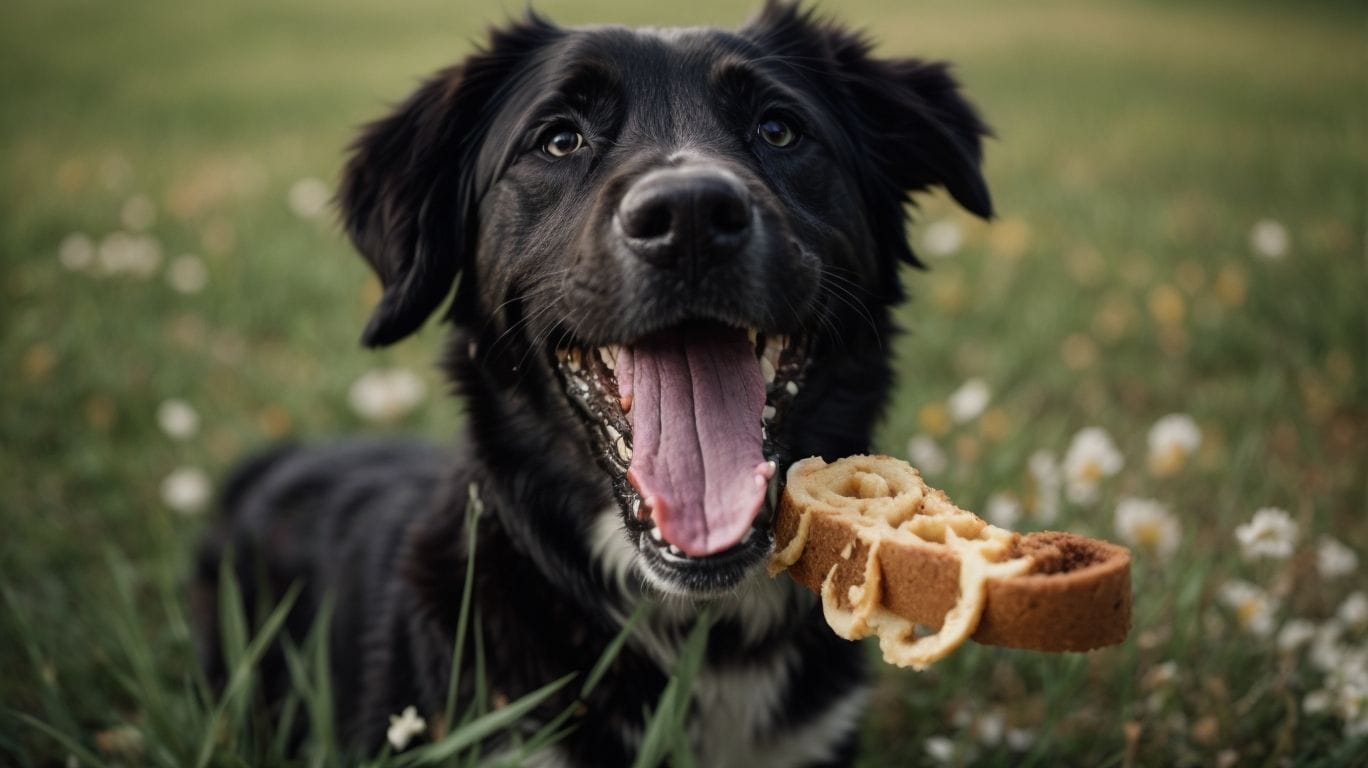
Photo Credits: Petnarnia.Com by Keith Anderson
When it comes to providing dogs with something to chew on, there are alternative options available that are both safer and healthier than bones. Here are some recommended alternatives to bones for dogs:
- Rubber or plastic chew toys: These toys are specifically designed for dogs and can effectively satisfy their natural urge to chew.
- Rope toys: Dogs can happily chew on and play with these toys, which also have the added benefit of helping to clean their teeth.
- Edible chews: A variety of edible chews, such as rawhides, bully sticks, and dental chews, offer dogs a satisfying chewing experience without the risk of bone splintering.
- Vegetables and fruits: Certain fruits and vegetables, such as carrot sticks or slices of apple, can be given to dogs as a healthy and enjoyable chewing option.
- Stuffed toys: Soft and safe stuffed toys can provide dogs with a pleasant chewing experience.
In 2018, there was an incident involving a dog named Max who required emergency veterinary treatment after eating a bone. The bone became lodged in Max’s throat, causing breathing difficulties. Thanks to swift action and emergency surgery, Max made a complete recovery. This incident emphasized the significance of offering dogs safe alternatives to bones.
What Are Safe Chew Toys for Dogs?
When it comes to finding safe chew toys for dogs, what are the factors to consider? Durability is important, so look for toys made from strong materials like rubber or nylon that can withstand chewing without breaking into small pieces. Another factor to consider is the size of the toy. It should be appropriately sized for your dog to prevent any choking hazards. Texture is also important. Since dogs have different preferences, select toys with varying textures, like ridges or bumps, to keep them engaged.
Additionally, safety features should be considered. Look for toys with no sharp edges or small parts that could be swallowed. Finally, interactive toys are great options as well. Toys that provide mental stimulation, such as puzzle toys or treat-dispensing toys, are a wonderful choice to keep your dog entertained.
What Natural Dental Chews Can Dogs Have?
When it comes to natural dental chews for dogs, there are several options available that can promote oral health and keep your dog’s teeth clean. Here are some examples to consider:
- What Natural Dental Chews Can Dogs Have? Raw Bones: Raw bones, such as rawhide or beef bones, can help remove plaque and tartar buildup from your dog’s teeth.
- What Natural Dental Chews Can Dogs Have? Dental Treats: There are specially formulated dental treats available that are designed to help reduce plaque and freshen your dog’s breath.
- What Natural Dental Chews Can Dogs Have? Vegetables: Certain vegetables like carrots or celery can act as natural dental chews for dogs, helping to clean their teeth as they chew.
- What Natural Dental Chews Can Dogs Have? Homemade Dental Chews: You can also make homemade dental chews for your dog using ingredients like sweet potatoes or coconut oil.
Remember to always supervise your dog while they are chewing on dental treats or bones to ensure their safety.
Some Facts About Can Dogs Digest Bones:
- ✅ Dogs should never be given cooked bones. Cooked bones can splinter and cause injuries to the mouth, tongue, and digestive system. (Source: Our Team)
- ✅ Dogs enjoy chewing bones for their taste and mental stimulation. Chewing bones also helps keep their teeth clean. (Source: Our Team)
- ✅ Bones provide nutritional benefits for dogs. They contain protein, calcium, magnesium, and other nutrients. (Source: Our Team)
- ✅ Giving dogs bones carries risks. These include the risk of severe infection, choking, constipation, and obstruction. (Source: Our Team)
- ✅ Consult a vet before feeding bones to dogs. Vets can provide guidance on which bones are safe and how to prepare them. (Source: Our Team)
